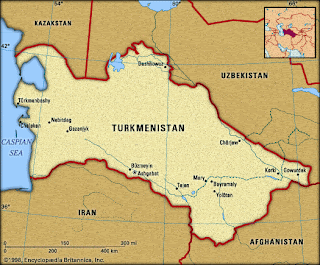Turkmenistan is made up mainly of desert and has the smallest population of the five former Soviet republics in Central Asia.
The government is autocratic, but the strict isolation imposed by eccentric dictator Saparmurat Niyazov has lifted somewhat after his death.
The country says it has the world's fifth largest estimated reserves of natural gas.
Overview
Turkmenistan is made up mainly of desert and has the smallest population of the five former Soviet republics in Central Asia.
The government is autocratic, but the strict isolation imposed by eccentric dictator Saparmurat Niyazov has lifted somewhat after his death.
The country says it has the world's fifth largest estimated reserves of natural gas.
His influence spread into every area of life in the republic. Turkmens were even expected to take spiritual guidance from his book, Ruhnama, a collection of thoughts on Turkmen culture and history.
His successor, Kurbanguly Berdymuhamedov, said he would follow in Mr Niyazov's footsteps, but increasingly showed signs of a different approach. He eschews the pomp that accompanied his predecessor's public appearances and has set about dismantling the Niyazov cult.
Turkmenistan is the most ethnically homogeneous of the Central Asian republics. There are some Uzbeks in the east, as well as small populations of Russians, Kazakhs, Tatars and others.
In contrast to other former Soviet republics, it has been largely free of inter-ethnic hostilities. However, strong tribal allegiances among the Turkmen can be a source of tension.
With foreign investors keeping away, the Turkmen economy remains underdeveloped.
The country has been unable to benefit fully from its gas and oil deposits because of an absence of export routes and a dispute between the Caspian Sea littoral states over the legal status of offshore oil.
Turkmenistan produces roughly 70 billion cubic metres of natural gas each year and about two-thirds of its exports go to Russia's Gazprom gas monopoly. A protracted dispute between the two countries over the price ended in September 2006 when Gazprom agreed to pay 54% more.
Turkmenistan has since made efforts to break out of Russia's hold on its exports. It has opened major gas pipelines to China and Iran, and is considering taking part in the Nabucco pipeline - an EU-backed project designed to provide an alternative to Russian gas supplies to Europe.
Facts
* Population: 5.2 million (UN, 2010)
* Capital: Ashgabat
* Area: 488,100 sq km (188,456 sq miles)
* Major language: Turkmen, Russian
* Major religion: Islam
* Life expectancy: 61 years (men), 69 years (women) (UN)
* Monetary unit: 1 Turkmen manat = 100 tenge
* Main exports: Oil, gas, textiles, raw cotton
* GNI per capita: US $3,800 (World Bank, 2010)
* Internet domain: .tm
* International dialling code: +993
Leaders
President: Kurbanguly Berdymukhamedov
Kurbanguly Berdymukhamedov was sworn in as president after winning elections in February 2007 with 89% of the vote.
There were six candidates in the poll, all from the Democratic Party of Turkmenistan. Exiled figures from the Turkmen opposition were banned from competing. Electoral officials put turnout out at over 95%. Rights groups and Western diplomats condemned the election as rigged.
Weeks later the president was chosen as chairman of the People's Council, Turkmenistan's highest legislative body. He was the only candidate.
A former deputy prime minister, Mr Berdymukhamedov became acting president after authoritarian leader Saparmyrat Niyazov died in December 2006. Mr Niyazov had been in power since Soviet times.
His nomination for the presidency surprised observers because under the constitution the post should have gone to People's Council chairman Ovezgeldy Atayev. However, after Mr Niyazov died Mr Atayev became the subject of a criminal investigation and was sacked.
The new president promised to continue the policies of his predecessor but also to introduce reforms, including unlimited access to the internet, better education and higher pensions.
Soon after coming to power, he restored pensions to more than 100,000 elderly citizens, reversing President Niyazov's decisions to withdraw them the previous year.
He has dismantled aspects of his predecessor's personality cult, but in part only to introduce the beginnings of one of his own. Already, a new mosque was named after him in 2009, and bookshops are full of Mr Berdymukhamedov's own works.
Once Mr Niyazov's personal dentist, Mr Berdymukhamedov became Turkmen health minister in 1997 and deputy premier in 2001. One of his tasks was to implement Mr Niyazov's closure of most medical facilities, which brought public health care to the point of collapse.
Kurbanguly Berdymukhamedov was born in 1957.
From : BBC News
